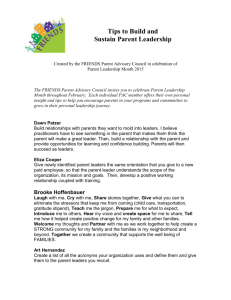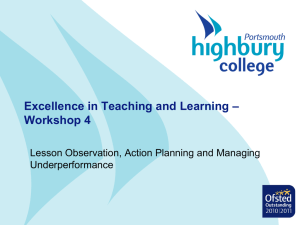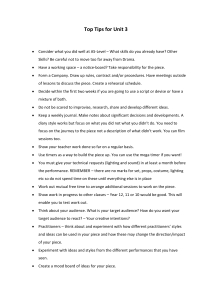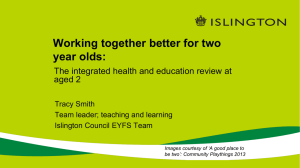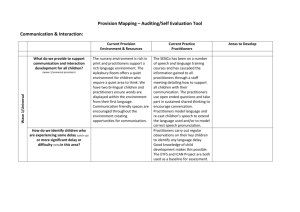Further Information for Applicants / Arts and Older People Drama
advertisement
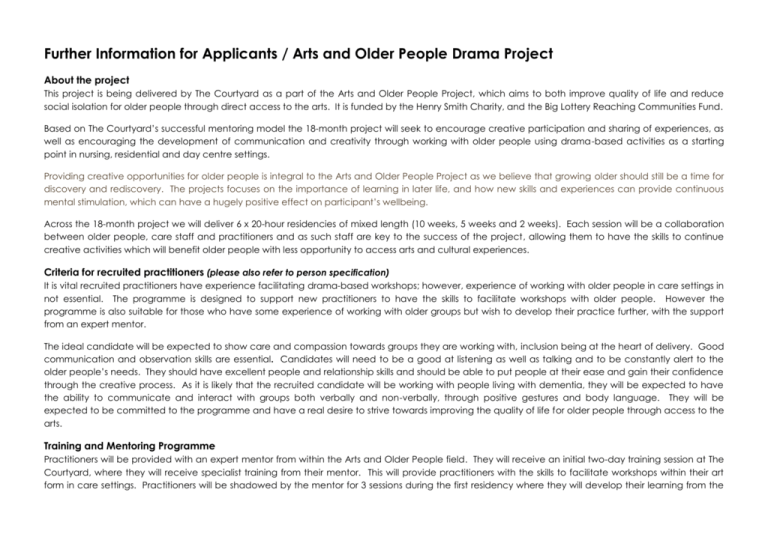
Further Information for Applicants / Arts and Older People Drama Project About the project This project is being delivered by The Courtyard as a part of the Arts and Older People Project, which aims to both improve quality of life and reduce social isolation for older people through direct access to the arts. It is funded by the Henry Smith Charity, and the Big Lottery Reaching Communities Fund. Based on The Courtyard’s successful mentoring model the 18-month project will seek to encourage creative participation and sharing of experiences, as well as encouraging the development of communication and creativity through working with older people using drama-based activities as a starting point in nursing, residential and day centre settings. Providing creative opportunities for older people is integral to the Arts and Older People Project as we believe that growing older should still be a time for discovery and rediscovery. The projects focuses on the importance of learning in later life, and how new skills and experiences can provide continuous mental stimulation, which can have a hugely positive effect on participant’s wellbeing. Across the 18-month project we will deliver 6 x 20-hour residencies of mixed length (10 weeks, 5 weeks and 2 weeks). Each session will be a collaboration between older people, care staff and practitioners and as such staff are key to the success of the project, allowing them to have the skills to continue creative activities which will benefit older people with less opportunity to access arts and cultural experiences. Criteria for recruited practitioners (please also refer to person specification) It is vital recruited practitioners have experience facilitating drama-based workshops; however, experience of working with older people in care settings in not essential. The programme is designed to support new practitioners to have the skills to facilitate workshops with older people. However the programme is also suitable for those who have some experience of working with older groups but wish to develop their practice further, with the support from an expert mentor. The ideal candidate will be expected to show care and compassion towards groups they are working with, inclusion being at the heart of delivery. Good communication and observation skills are essential. Candidates will need to be a good at listening as well as talking and to be constantly alert to the older people’s needs. They should have excellent people and relationship skills and should be able to put people at their ease and gain their confidence through the creative process. As it is likely that the recruited candidate will be working with people living with dementia, they will be expected to have the ability to communicate and interact with groups both verbally and non-verbally, through positive gestures and body language. They will be expected to be committed to the programme and have a real desire to strive towards improving the quality of life for older people through access to the arts. Training and Mentoring Programme Practitioners will be provided with an expert mentor from within the Arts and Older People field. They will receive an initial two-day training session at The Courtyard, where they will receive specialist training from their mentor. This will provide practitioners with the skills to facilitate workshops within their art form in care settings. Practitioners will be shadowed by the mentor for 3 sessions during the first residency where they will develop their learning from the initial training. Practitioners will then go onto complete the rest of the residencies independently; however, they will be provided with regular meetings and remote mentoring. (See below) Remote mentoring and quarterly meetings Throughout the project it is likely that the practitioner will encounter new situations and challenges when facilitating their residencies. To ensure that practitioners feel supported to continue to deliver work on this programme they will be provided with remote mentoring from their mentor. This means they can get in touch with their mentor via Skype, email or telephone. Also they will meet quarterly with their mentor and the 3 other practitioners who are working on the project. These quarterly meetings will allow the practitioner the opportunity to share their learning and experiences, as well being provided with additional professional development support to continue to develop on the programme. Delivery Scale and Fee for year 1 – from January 2015 2 x training days at The Courtyard Centre for the Arts (8 & 9 Dec 2014) 3 x 20-hour mixed-length residencies NO FEE, but travel and accommodation costs will be covered. £2020 (£25 an hour) plus travel and material expenses It is essential that applicants are able to attend both the training dates (8 & 9 Dec 2014). Please confirm in your covering letter that you can attend on these dates. These residencies will take place around your other freelance commitments at three points throughout the year. 2 x Project Meetings FEE £100 (£50 per meeting) plus travel costs These meetings will each last a total of 2 hrs Materials A materials budget will be provided to practitioners for use within the residencies. After their initial training they will be able to discuss with their mentor ideas they may have and the materials required. The budget will be allocated to practitioners before they start a residency or in some cases materials will not be sourced until practitioners have met the residents they are working with and assessed the materials required. Travel Expenses Travel by car: practitioners can claim 30p a mile for travel by car from their home address to the location of the residency and / or The Courtyard and subsequent return journey. Travel by train/bus: practitioners will keep rail tickets as proof of journey. Invoicing Practitioners will invoice The Courtyard on a monthly basis, invoices to include travel expense claims.
